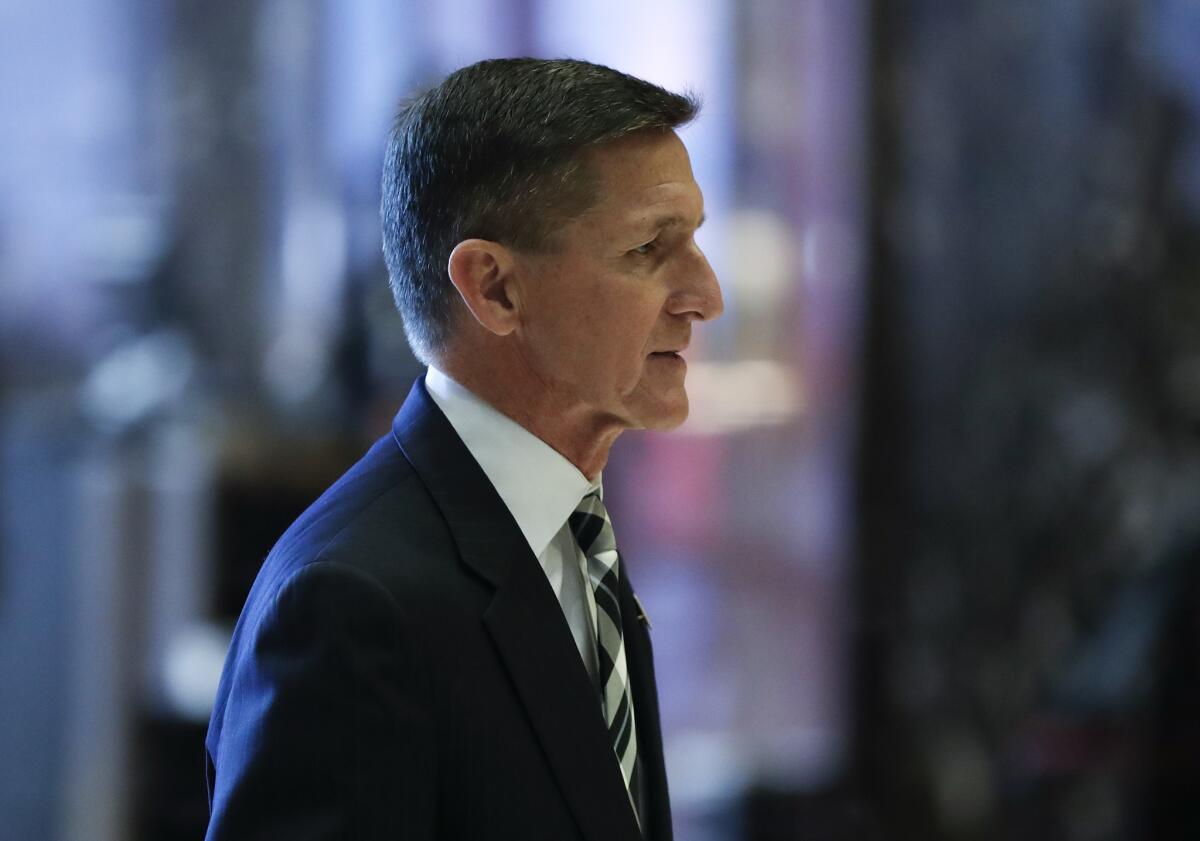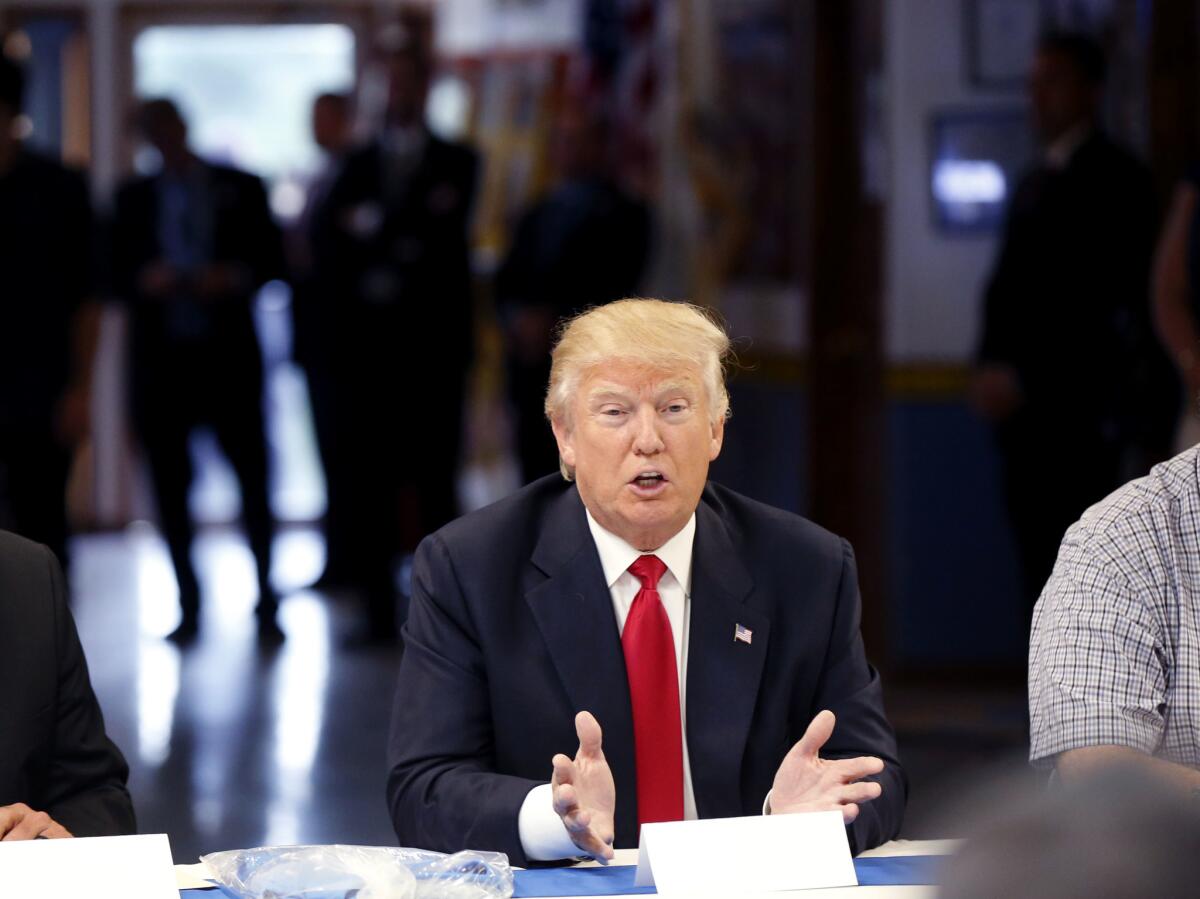Why the Comey memo could be so explosive for Trump
- Share via
A memo in which former FBI Director James B. Comey says President Trump asked him to shut down a criminal investigation of former national security advisor Michael Flynn is likely to emerge as a key piece of evidence in the case, legal experts say.
During a Feb. 14 meeting in the Oval Office, the president urged Comey to “let this go,” according to a memo Comey wrote afterward. An associate of Comey who had read the memo described its contents to the Los Angeles Times. News of the memo was first reported by the New York Times.
Flynn had been fired one day before the purported conversation between Trump and Comey for misleading White House officials about the nature and extent of his contacts with Russia’s ambassador to the United States. Last week, Trump fired Comey.

Why the memo is important
If Comey were called to testify before the Senate Intelligence Committee, which has launched one of several investigations into ties between the Trump campaign and Russia, the existence of the memo could lend credence to any testimony he gave, said Richard Drooyan, a former federal prosecutor in Los Angeles.
“That memo is significant because it predates him being fired and it basically precludes anybody from making the claim that he’s testifying about that situation because he was fired,” Drooyan said.
The White House denied that Trump asked Comey to end the Flynn investigation.

Why Comey would write the memo
Drooyan said it was not unusual for FBI officials to document meetings with people connected to high-profile investigations.
“It’s not surprising to me at all that Comey would have memorialized a conversation like that if he felt that the president was potentially trying to influence him in the conducting of that investigation,” Drooyan said.
The Senate Intelligence Committee could subpoena the memo, according to Drooyan, who said the document might be exempt from rules governing hearsay if it was found to be a “public record” that detailed FBI activities.
“It’s arguably a memo that sets out the office’s activities, namely what Comey was doing having a conversation with the president,” Drooyan said.
Members of the House Intelligence and Oversight committees suggested on Tuesday they would seek to subpoena the memo.
How could Trump try to blunt the memo
Trump could claim executive privilege to block a subpoena of the memo, but he would be unlikely to succeed, Drooyan said.
“The only issue is sometimes presidents do claim executive privilege of communications with their subordinates,” Drooyan said. “In U.S. vs. Nixon, a court clearly ordered the president to turn over tape recordings that he had with his closer aides…. I don’t see any reason why this would not be subpoenaed by the Senate Intelligence Committee.”
The veracity of Comey’s recollection of the meeting could be called into question, according to Eugene O’Donnell, a former New York prosecutor who is now a professor at the John Jay College of Criminal Justice.
“Then you get into an issue like how precise his documentation was. Did he exactly write word for word what the president said?” O’Donnell asked.
Do Trump’s alleged actions amount to a crime?
Determining whether or not Trump’s comments constitute an effort to obstruct or impede an FBI investigation is complicated. The federal criminal statute for obstruction of justice requires prosecutors to prove someone “acted with a corrupt intent to influence, intimidate or impede an investigation,” according to Drooyan.
That conduct must happen in conjunction with “some type of criminal proceeding,” such as a grand jury investigation or the issuing of subpoenas. A federal grand jury in Virginia issued subpoenas for records related to Flynn in recent weeks, but the conversation between Trump and Comey took place before those subpoenas were issued.
“That’s a tricky statute,” O’Donnell said. “Was it intentional? Was it his conscious objective to thwart the investigation? Could you prove that beyond a reasonable doubt?”
For more breaking crime and cops news in Southern California, follow me on Twitter: @JamesQueallyLAT
ALSO
Trump’s war with U.S. intelligence agencies just got a lot worse
Q&A: Here’s what you need to know about Comey’s memo on Trump conversation
More to Read
Get the L.A. Times Politics newsletter
Deeply reported insights into legislation, politics and policy from Sacramento, Washington and beyond. In your inbox three times per week.
You may occasionally receive promotional content from the Los Angeles Times.











